公共图书馆宣言(中英文版)
图书馆公约5条英语作文
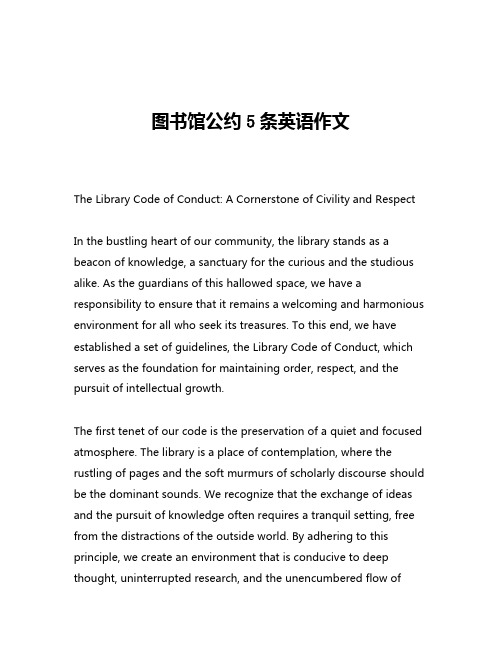
图书馆公约5条英语作文The Library Code of Conduct: A Cornerstone of Civility and RespectIn the bustling heart of our community, the library stands as a beacon of knowledge, a sanctuary for the curious and the studious alike. As the guardians of this hallowed space, we have a responsibility to ensure that it remains a welcoming and harmonious environment for all who seek its treasures. To this end, we have established a set of guidelines, the Library Code of Conduct, which serves as the foundation for maintaining order, respect, and the pursuit of intellectual growth.The first tenet of our code is the preservation of a quiet and focused atmosphere. The library is a place of contemplation, where the rustling of pages and the soft murmurs of scholarly discourse should be the dominant sounds. We recognize that the exchange of ideas and the pursuit of knowledge often requires a tranquil setting, free from the distractions of the outside world. By adhering to this principle, we create an environment that is conducive to deep thought, uninterrupted research, and the unencumbered flow ofideas.Secondly, we emphasize the importance of respecting the property and resources of the library. The books, journals, and digital materials entrusted to our care are the collective intellectual heritage of our community, and we have a duty to ensure their preservation for generations to come. This means handling these materials with the utmost care, returning them in a timely manner, and refraining from any actions that could lead to their damage or loss. By upholding this standard, we demonstrate our commitment to the stewardship of knowledge and the responsible use of the resources available to us.The third principle of our code is the maintenance of personal hygiene and the consideration of others. The library is a shared space, and each individual has a responsibility to ensure that their presence does not negatively impact the comfort or well-being of their fellow patrons. This includes practicing good hygiene, refraining from bringing in strong odors or excessive noise, and being mindful of the personal space of others. By adhering to these guidelines, we foster an environment of mutual respect and consideration, where everyone can feel at ease and focused on their tasks.The fourth tenet of our code is the responsible use of technology. In the digital age, the library has become a hub for the integration oftechnology and the pursuit of knowledge. While we embrace the benefits that technology can bring, we also recognize the need to ensure that its use does not disrupt the learning environment. This means silencing electronic devices, refraining from engaging in activities that could distract others, and utilizing technology in a manner that is respectful of the needs and preferences of the surrounding community.Finally, we emphasize the importance of maintaining a safe and secure environment. The library is a place of learning and discovery, and we have a responsibility to ensure that it remains a haven free from harm. This includes adhering to all safety protocols, reporting any suspicious or concerning behavior, and cooperating with library staff and authorities to maintain the integrity of the space. By upholding this principle, we contribute to the overall well-being of our community and ensure that the library remains a trusted and reliable resource for all who seek its services.The Library Code of Conduct is more than just a set of rules; it is a reflection of our shared values and a commitment to the creation of a harmonious and enriching environment. By embracing these principles, we not only safeguard the physical and intellectual resources of the library but also foster a culture of mutual respect, civic responsibility, and the pursuit of knowledge. As stewards of this hallowed space, we have a duty to ensure that the library remains abeacon of enlightenment, a sanctuary for the curious, and a hub for the exchange of ideas that will shape the future of our community and beyond.。
IFLA联合国教科文组织公共图书馆宣言1994
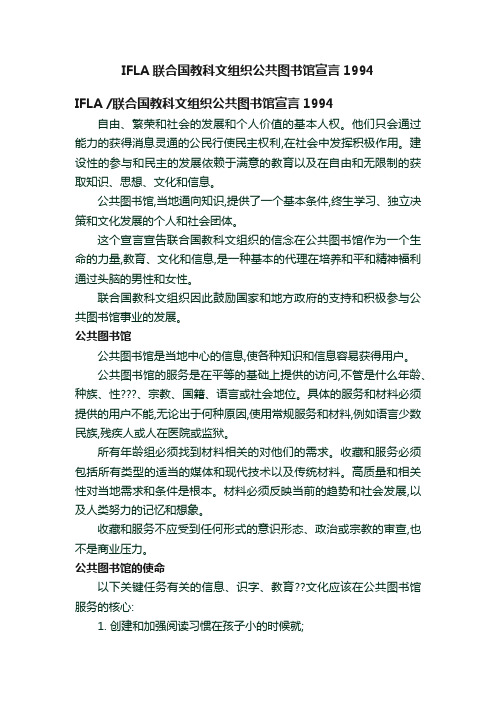
IFLA联合国教科文组织公共图书馆宣言1994IFLA /联合国教科文组织公共图书馆宣言1994自由、繁荣和社会的发展和个人价值的基本人权。
他们只会通过能力的获得消息灵通的公民行使民主权利,在社会中发挥积极作用。
建设性的参与和民主的发展依赖于满意的教育以及在自由和无限制的获取知识、思想、文化和信息。
公共图书馆,当地通向知识,提供了一个基本条件,终生学习、独立决策和文化发展的个人和社会团体。
这个宣言宣告联合国教科文组织的信念在公共图书馆作为一个生命的力量,教育、文化和信息,是一种基本的代理在培养和平和精神福利通过头脑的男性和女性。
联合国教科文组织因此鼓励国家和地方政府的支持和积极参与公共图书馆事业的发展。
公共图书馆公共图书馆是当地中心的信息,使各种知识和信息容易获得用户。
公共图书馆的服务是在平等的基础上提供的访问,不管是什么年龄、种族、性、宗教、国籍、语言或社会地位。
具体的服务和材料必须提供的用户不能,无论出于何种原因,使用常规服务和材料,例如语言少数民族,残疾人或人在医院或监狱。
所有年龄组必须找到材料相关的对他们的需求。
收藏和服务必须包括所有类型的适当的媒体和现代技术以及传统材料。
高质量和相关性对当地需求和条件是根本。
材料必须反映当前的趋势和社会发展,以及人类努力的记忆和想象。
收藏和服务不应受到任何形式的意识形态、政治或宗教的审查,也不是商业压力。
公共图书馆的使命以下关键任务有关的信息、识字、教育??文化应该在公共图书馆服务的核心:1.创建和加强阅读习惯在孩子小的时候就;2.支持个人和自我进行教育以及各级正规教育;3.个人创造性的发展提供了机遇;4.激发想象力和创造力的儿童和年轻人;5.促进文化遗产的认识、欣赏艺术、科学成就和创新;6.提供访问所有表演艺术文化的表达;7.培养跨文化对话,有利于文化多样性;8.支持口头传统;9.确保访问公民各种社区信息;10.提供足够的信息服务当地企业、协会和利益集团;11.促进发展的信息和计算机知识技能;12.支持和参与识字活动和计划为所有年龄组,挑起这样的活动,如果必要的。
联合国教科文组织公共图书馆宣言1994
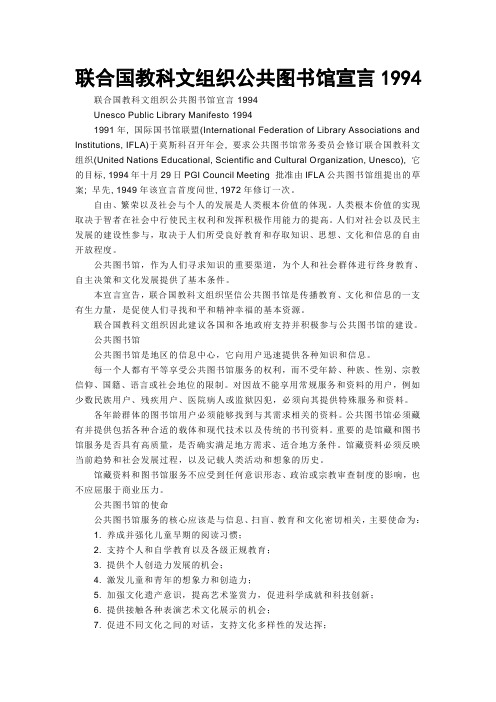
联合国教科文组织公共图书馆宣言1994 联合国教科文组织公共图书馆宣言1994Unesco Public Library Manifesto 19941991年, 国际国书馆联盟(International Federation of Library Associations and Institutions, IFLA)于莫斯科召开年会, 要求公共图书馆常务委员会修订联合国教科文组织(United Nations Educational, Scientific and Cultural Organization, Unesco), 它的目标, 1994年十月29日PGI Council Meeting 批准由IFLA公共图书馆组提出的草案; 早先, 1949年该宣言首度问世, 1972年修订一次。
自由、繁荣以及社会与个人的发展是人类根本价值的体现。
人类根本价值的实现取决于智者在社会中行使民主权利和发挥积极作用能力的提高。
人们对社会以及民主发展的建设性参与,取决于人们所受良好教育和存取知识、思想、文化和信息的自由开放程度。
公共图书馆,作为人们寻求知识的重要渠道,为个人和社会群体进行终身教育、自主决策和文化发展提供了基本条件。
本宣言宣告,联合国教科文组织坚信公共图书馆是传播教育、文化和信息的一支有生力量,是促使人们寻找和平和精神幸福的基本资源。
联合国教科文组织因此建议各国和各地政府支持并积极参与公共图书馆的建设。
公共图书馆公共图书馆是地区的信息中心,它向用户迅速提供各种知识和信息。
每一个人都有平等享受公共图书馆服务的权利,而不受年龄、种族、性别、宗教信仰、国籍、语言或社会地位的限制。
对因故不能享用常规服务和资料的用户,例如少数民族用户、残疾用户、医院病人或监狱囚犯,必须向其提供特殊服务和资料。
各年龄群体的图书馆用户必须能够找到与其需求相关的资料。
公共图书馆必须藏有并提供包括各种合适的载体和现代技术以及传统的书刊资料。
公共图书馆宣言
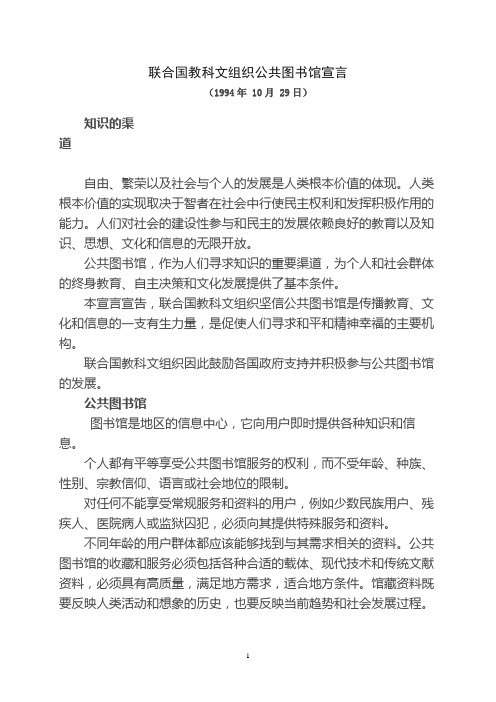
联合国教科文组织公共图书馆宣言(1994年 10月 29日)知识的渠道自由、繁荣以及社会与个人的发展是人类根本价值的体现。
人类根本价值的实现取决于智者在社会中行使民主权利和发挥积极作用的能力。
人们对社会的建设性参与和民主的发展依赖良好的教育以及知识、思想、文化和信息的无限开放。
公共图书馆,作为人们寻求知识的重要渠道,为个人和社会群体的终身教育、自主决策和文化发展提供了基本条件。
本宣言宣告,联合国教科文组织坚信公共图书馆是传播教育、文化和信息的一支有生力量,是促使人们寻求和平和精神幸福的主要机构。
联合国教科文组织因此鼓励各国政府支持并积极参与公共图书馆的发展。
公共图书馆图书馆是地区的信息中心,它向用户即时提供各种知识和信息。
个人都有平等享受公共图书馆服务的权利,而不受年龄、种族、性别、宗教信仰、语言或社会地位的限制。
对任何不能享受常规服务和资料的用户,例如少数民族用户、残疾人、医院病人或监狱囚犯,必须向其提供特殊服务和资料。
不同年龄的用户群体都应该能够找到与其需求相关的资料。
公共图书馆的收藏和服务必须包括各种合适的载体、现代技术和传统文献资料,必须具有高质量,满足地方需求,适合地方条件。
馆藏资料既要反映人类活动和想象的历史,也要反映当前趋势和社会发展过程。
图书馆的收藏资料和服务不应受到任何意识形态、政治或宗教检查制度的影响,也不应屈服于商业压力。
公共图书馆的使命公共图书馆服务的核心应该与信息、扫盲、教育和文化密切相关,主要使命为:1、尽早培育并加强儿童的阅读习惯;2、既支持各级正规教育,也支持个人和自学教育;3、提供个人创造力发展的机会;4.激发儿童和青年的想象力和创造力;5.加强文化遗产意识,提高对艺术、科技成就与创新的鉴赏力;6.提供接触各种表演艺术文化展示的机会;7.促进不同文化之间的对话,支持文化多样性;8.支持口述传统文化;9.保证公民获取各种社区信息;10.为地方企业、社团和兴趣团体提供充足的信息服务;11.促进信息的发展和计算机应用能力的提高;12.支持并参与各年龄群体的扫盲活动和计划,并根据需要组织此类活动。
英文版读书馆告示语作文
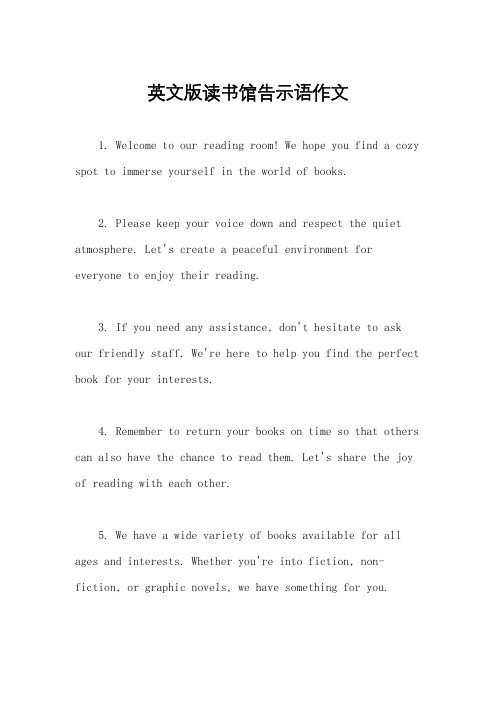
英文版读书馆告示语作文1. Welcome to our reading room! We hope you find a cozy spot to immerse yourself in the world of books.2. Please keep your voice down and respect the quiet atmosphere. Let's create a peaceful environment for everyone to enjoy their reading.3. If you need any assistance, don't hesitate to ask our friendly staff. We're here to help you find the perfect book for your interests.4. Remember to return your books on time so that others can also have the chance to read them. Let's share the joy of reading with each other.5. We have a wide variety of books available for all ages and interests. Whether you're into fiction, non-fiction, or graphic novels, we have something for you.6. Take a break from your busy day and lose yourself ina good book. It's the perfect way to relax and unwind.7. Feel free to bring your own snacks and drinks, but please be mindful of keeping the area clean and tidy.8. Don't forget to check out our upcoming events and book clubs. It's a great way to meet fellow book lovers and discuss your favorite reads.9. We're always open to suggestions for new books to add to our collection. Let us know if there's somethingyou'd like to see on our shelves.10. Thank you for choosing our reading room as your literary escape. We hope you have a wonderful time exploring the world of books.。
中国图书馆学会图书馆服务宣言(2008) - Evergreen Education ...

中国图书馆学会·图书馆服务宣言(2008)图书馆是通向知识之门,它通过系统收集、保存与组织文献信息,实现传播知识、传承文明的社会功能。
现代图书馆秉承对全社会开放的理念,承担实现和保障公民文化权利、缩小社会信息鸿沟的使命。
中国图书馆人经过不懈的追求与努力,逐步确立了对社会普遍开放、平等服务、以人为本的基本原则。
我们的目标是:1.图书馆是一个开放的知识与信息中心。
图书馆以公益性服务为基本原则,以实现和保障公民基本阅读权利为天职,以读者需求为一切工作的出发点。
2.图书馆向读者提供平等服务。
各级各类图书馆共同构成图书馆体系,保障全体社会成员普遍均等地享有图书馆服务。
3.图书馆在服务与管理中体现人文关怀。
图书馆致力于消除弱势群体利用图书馆的困难,为全体读者提供人性化、便利化的服务。
4.图书馆提供优质、高效、专业的服务。
图书馆充分利用现代信息技术,提高数字资源提供能力和使用效率,以服务创新应对信息时代的挑战。
5.图书馆开展信息资源共建共享。
各地区、各类型图书馆加强协调与合作,促进全社会信息资源的有效利用。
6.图书馆努力促进全民阅读。
图书馆为公民终身学习提供保障,促进学习型社会的建设。
7.图书馆与一切关心图书馆事业的组织和个人真诚合作。
图书馆欢迎社会各界通过资助、捐赠、媒体宣传、志愿者活动等各种方式,参与图书馆建设。
《图书馆服务宣言》诞生大事记2006年12月,中国图书馆学会在苏州召开“2007新年峰会”,宣布启动中国图书馆学会《图书馆服务宣言》的制定。
2007年3月,中国图书馆学会正式启动并资助“中国图书馆的核心价值与《图书馆服务宣言》研究”课题,范并思和倪晓建担任课题负责人。
2007年6月,第一稿《图书馆服务宣言》推出,征求意见并修改。
2007年8月,《图书馆服务宣言》(草案)在兰州召开的中国图书馆学会年会上宣读,并举办“《图书馆服务宣言》大家谈”分会场讨论。
2007年11月,中国图书馆学会在常熟召开第二届百县馆长论坛、天津召开的全国图书馆学会工作会议期间,就《图书馆服务宣言》征求专家、学者和基层图书馆工作者的意见并进行修改。
从《公共图书馆宣言》认识公共图书馆阅读推广

T U S H U G U A N X U E K A NN O .12,2023图书馆学刊2023年第12期从《公共图书馆宣言》认识公共图书馆阅读推广冯莉(广州图书馆,广东广州510623)[摘要]分析1949版、1972版、1994版和2022版《公共图书馆宣言》的发布背景与基本特点,剖析《公共图书馆宣言》对阅读推广的专业化发展、平等服务、社会合作、制度建设4方面所带来的价值,以及对阅读推广体系协同发展、可持续发展的启发。
[关键词]《公共图书馆宣言》公共图书馆阅读推广[分类号]G 251.3*本文系2021年广州市图书馆科研课题“城市中心图书馆未成年人‘图书馆+家庭’阅读推广模式研究”(项目编号:2021G Z T K 16)的研究成果之一。
联合国教科文组织1949年发布的《公共图书馆宣言》(以下简称“《宣言》”),是公共图书馆发展过程中极其重要的指导性纲领。
1949版《宣言》(初版)原称为《公共图书馆:民众教育的生力军》发布后,联合国教科文组织、国际图联共同在1972年、1994年对《宣言》进行了两次修订,所述内容对公共图书馆基本职能和社会责任有了更为清晰的定位。
2022年,国际图联发布了新版《宣言》,进一步明确公共图书馆的社会定位。
历版《宣言》内容的变革,反映了公共图书馆使命和服务理念的变化与发展,时至今日,公共图书馆业界所关注的问题与方向,几乎都能在历版《宣言》的文本中找到踪迹。
范并思曾提到,阅读推广从图书馆创新服务成了主流服务是公共图书馆事业的重大变化[1]。
阅读推广是我国公共图书馆实践发展的一种重要体现,笔者以历版《宣言》内容的变革为基础展开深入分析,通过剖析各版《宣言》对阅读推广发展的价值所在,重新认识公共图书馆阅读推广。
1历版《宣言》的发布背景与基本特点每版《宣言》的内容特点都与其颁布时的社会发展背景密切相关,既能从宏观层面反映公共图书馆在社会发展中扮演的角色,又能从微观之处洞悉公共图书馆服务理念的变革。
公共图书馆宣言(中英文版)

联合国教科文组织公共图书馆宣言19941991年, 国际国书馆联盟(International Federation of Library Associations and Institutions, IFLA)于莫斯科召开年会, 要求公共图书馆常务委员会修订联合国教科文组织(United Nations Educational, Scientific and Cultural Organization, Unesco), 它的目标, 1994年十月29日PGI Council Meeting 批准由IFLA公共图书馆组提出的草案; 早先, 1949年该宣言首度问世, 1972年修订一次。
自由、繁荣以及社会与个人的发展是人类根本价值的体现。
人类根本价值的实现取决于智者在社会中行使民主权利和发挥积极作用能力的提高。
人们对社会以及民主发展的建设性参与,取决于人们所受良好教育和存取知识、思想、文化和信息的自由开放程度。
公共图书馆,作为人们寻求知识的重要渠道,为个人和社会群体进行终身教育、自主决策和文化发展提供了基本条件。
本宣言宣告,联合国教科文组织坚信公共图书馆是传播教育、文化和信息的一支有生力量,是促使人们寻找和平和精神幸福的基本资源。
联合国教科文组织因此建议各国和各地政府支持并积极参与公共图书馆的建设。
公共图书馆公共图书馆是地区的信息中心,它向用户迅速提供各种知识和信息。
每一个人都有平等享受公共图书馆服务的权利,而不受年龄、种族、性别、宗教信仰、国籍、语言或社会地位的限制。
对因故不能享用常规服务和资料的用户,例如少数民族用户、残疾用户、医院病人或监狱囚犯,必须向其提供特殊服务和资料。
各年龄群体的图书馆用户必须能够找到与其需求相关的资料。
公共图书馆必须藏有并提供包括各种合适的载体和现代技术以及传统的书刊资料。
重要的是馆藏和图书馆服务是否具有高质量,是否确实满足地方需求、适合地方条件。
馆藏资料必须反映当前趋势和社会发展过程,以及记载人类活动和想象的历史。
- 1、下载文档前请自行甄别文档内容的完整性,平台不提供额外的编辑、内容补充、找答案等附加服务。
- 2、"仅部分预览"的文档,不可在线预览部分如存在完整性等问题,可反馈申请退款(可完整预览的文档不适用该条件!)。
- 3、如文档侵犯您的权益,请联系客服反馈,我们会尽快为您处理(人工客服工作时间:9:00-18:30)。
联合国教科文组织公共图书馆宣言19941991年, 国际国书馆联盟(International Federation of Library Associations and Institutions, IFLA)于莫斯科召开年会, 要求公共图书馆常务委员会修订联合国教科文组织(United Nations Educational, Scientific and Cultural Organization, Unesco), 它的目标, 1994年十月29日PGI Council Meeting 批准由IFLA公共图书馆组提出的草案; 早先, 1949年该宣言首度问世, 1972年修订一次。
自由、繁荣以及社会与个人的发展是人类根本价值的体现。
人类根本价值的实现取决于智者在社会中行使民主权利和发挥积极作用能力的提高。
人们对社会以及民主发展的建设性参与,取决于人们所受良好教育和存取知识、思想、文化和信息的自由开放程度。
公共图书馆,作为人们寻求知识的重要渠道,为个人和社会群体进行终身教育、自主决策和文化发展提供了基本条件。
本宣言宣告,联合国教科文组织坚信公共图书馆是传播教育、文化和信息的一支有生力量,是促使人们寻找和平和精神幸福的基本资源。
联合国教科文组织因此建议各国和各地政府支持并积极参与公共图书馆的建设。
公共图书馆公共图书馆是地区的信息中心,它向用户迅速提供各种知识和信息。
每一个人都有平等享受公共图书馆服务的权利,而不受年龄、种族、性别、宗教信仰、国籍、语言或社会地位的限制。
对因故不能享用常规服务和资料的用户,例如少数民族用户、残疾用户、医院病人或监狱囚犯,必须向其提供特殊服务和资料。
各年龄群体的图书馆用户必须能够找到与其需求相关的资料。
公共图书馆必须藏有并提供包括各种合适的载体和现代技术以及传统的书刊资料。
重要的是馆藏和图书馆服务是否具有高质量,是否确实满足地方需求、适合地方条件。
馆藏资料必须反映当前趋势和社会发展过程,以及记载人类活动和想象的历史。
馆藏资料和图书馆服务不应受到任何意识形态、政治或宗教审查制度的影响,也不应屈服于商业压力。
公共图书馆的使命公共图书馆服务的核心应该是与信息、扫盲、教育和文化密切相关,主要使命为:1. 养成并强化儿童早期的阅读习惯;2. 支持个人和自学教育以及各级正规教育;3. 提供个人创造力发展的机会;4. 激发儿童和青年的想象力和创造力;5. 加强文化遗产意识,提高艺术鉴赏力,促进科学成就和科技创新;6. 提供接触各种表演艺术文化展示的机会;7. 促进不同文化之间的对话,支持文化多样性的发展;8. 支持口述传统文化的保存和传播;9. 保证市民获取各种社区信息;10. 为地方企业、社团群体提供充足的信息服务;11. 促进信息技术的发展和计算机应用能力的提高;12. 支持并参与各年龄群体的扫盲活动和计划,在必要时组织发起这样的活动。
拔款、立法和网络1. 公共图书馆原则上应该免费提供服务。
建立公共图书馆是国家和地方政府的责任。
必须专门立法维持公共图书馆,并由国家和地方政府财政拔款。
图书馆应该是继承文化、传递信息、扫盲和长期教育战略的基本组成部分。
2. 为保证全国图书馆的协调和合作,必须立法并制定战略计划,来确定并建设同一服务标准的全国图书馆网络。
3. 公共图书馆的网络设计必须考虑到与国家图书馆、地方图书馆、研究图书馆和专业图书馆,以及大中小学图书馆之间的关系。
运作与管理1. 必须制定清晰的政策,确定与社区需求相关的目标、重点和图书馆服务。
必须有效地组织公共图书馆并保持运作的专业水准。
2. 必须确保与有关合作伙伴(用户群体和其他专业人员)进行地方、区域、全国甚至国际性合作。
3. 使社区每一个人都能确实得到图书馆服务。
需要有理想的馆舍环境、良好的阅读学习设施,以及相关的技术和充足的开馆时间,包括对不能到馆的用户提供馆外服务。
4. 图书馆服务必须适应乡村和城市社区的不同需求。
5. 图书馆员是图书馆用户和馆藏资源之间的能动的中间人。
图书馆员的专业培训和继续教育对保证服务质量非常重要。
6. 必须制定馆外教育和用户培训计划,帮助用户从各种馆藏资源中获取有价值的信息。
宣言的贯彻和落实宣言特此敦促全世界各个国家和地方的决策者和整个图书馆界,应认真贯彻和落实宣言表述的各项原则。
联合国教科文组织国际图联1994年 10月 29日IFLA/UNESCO Public Library Manifesto 1994Freedom, prosperity and the development of society and of individuals are fundamental human values. They will only be attained through the ability of well-informed citizens to exercise their democratic rights and to play an active role in society. Constructive participation and the development of democracy depend on satisfactory education as well as on free and unlimited access to knowledge, thought, culture and information.The public library, the local gateway to knowledge, provides a basic condition for lifelong learning, independent decision- making and cultural development of the individual and social groups.This Manifesto proclaims UNESCO's belief in the public library as a living force for education, culture and information, and as an essential agent for the fostering of peace and spiritual welfare through the minds of men and women.UNESCO therefore encourages national and local governments to support and actively engage in the development of public libraries.The Public LibraryThe public library is the local centre of information, making all kinds of knowledge and information readily available to its users.The services of the public library are provided on the basis of equality of access for all, regardless of age, race, sex, religion, nationality, language or social status. Specific services and materials must be provided for those users who cannot, for whatever reason, use the regular services and materials, for example linguistic minorities,people with disabilities or people in hospital or prison.All age groups must find material relevant to their needs. Collections and services have to include all types of appropriate media and modern technologies as well as traditional materials. High quality and relevance to local needs and conditions are fundamental. Material must reflect current trends and the evolution of society, as well as the memory of human endeavour and imagination.Collections and services should not be subject to any form of ideological, political or religious censorship, nor commercial pressures.Missions of the Public LibraryThe following key missions which relate to information, literacy, education and culture should be at the core of public library services:(1)creating and strengthening reading habits in children from an early age;(2)supporting both individual and self conducted education as well as formal education at all levels;(3)providing opportunities for personal creative development;(4)stimulating the imagination and creativity of children and young people;(5)promoting awareness of cultural heritage, appreciation of the arts, scientific achievements and innovations;(6)providing access to cultural expressions of all performing arts;(7)fostering inter-cultural dialogue and favoring cultural diversity;(8)supporting the oral tradition;(9)ensuring access for citizens to all sorts of community information;(10)providing adequate information services to local enterprises, associations and interest groups;(11)facilitating the development of information and computer literacy skills;(12)supporting and participating in literacy activities and programs for all age groups, and initiating such activities if necessary.Funding, legislation and networksThe public library shall in principle are free of charge.The public library shall in principle be free of charge. The public library is the responsibility of local and national authorities. It must be supported by specific legislation and financed by national and local governments. It has to be an essential component of any long-term strategy for culture, information provision, literacy and education.To ensure nationwide library coordination and cooperation, legislation and strategic plans must also define and promote a national library network based on agreed standards of service.The public library network must be designed in relation to national, regional, research and special libraries as well as libraries in schools, colleges and universities.Operation and managementA clear policy must be formulated, defining objectives, priorities and services in relation to the local community needs. The public library has to be organized effectively and professional standards of operation must be maintained.Cooperation with relevant partners - for example, user groups and other professionals at local, regional, national as well as international level- has to be ensured.Services have to be physically accessible to all members of the community. This requires well situated library buildings, good reading and study facilities, as well as relevant technologies and sufficient opening hours convenient to the users. It equally implies outreach services for those unable to visit the library.The library services must be adapted to the different needs of communities in rural and urban areas.The librarian is an active intermediary between users and resources.Professional and continuing education of the librarian is indispensable to ensure adequate services.Outreach and user education programmes have to be provided to help users benefit from all the resources.Implementing the ManifestoDecision makers at national and local levels and the library community at large, around the world, are hereby urged to implement the principles expressed in this Manifesto.---------------------------------------------------------------------------- The Manifesto is prepared in cooperation with the International Federation of Library Associations and Institutions (IFLA).。
